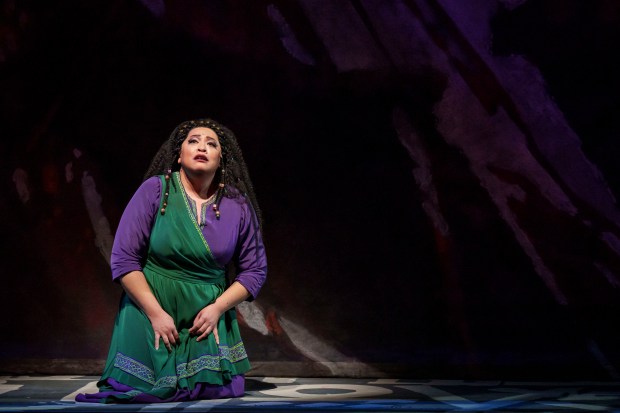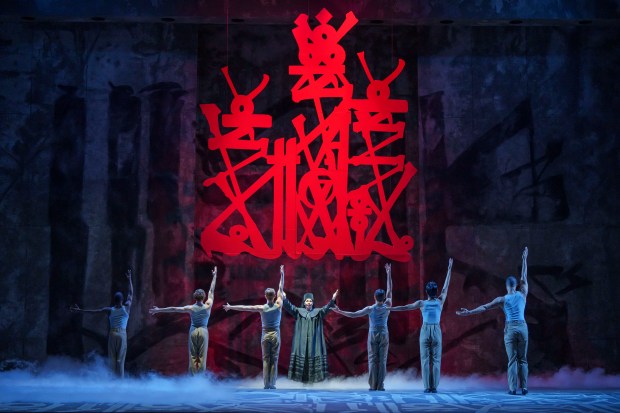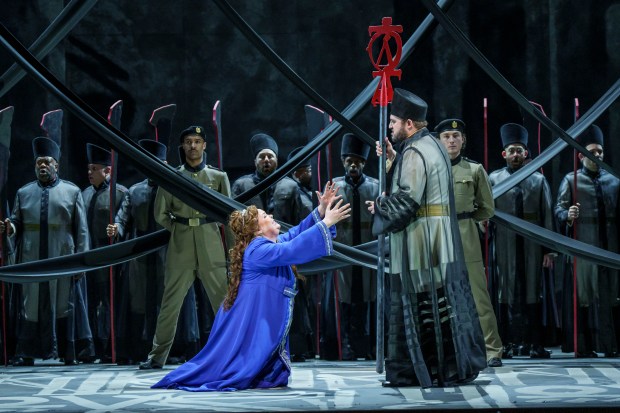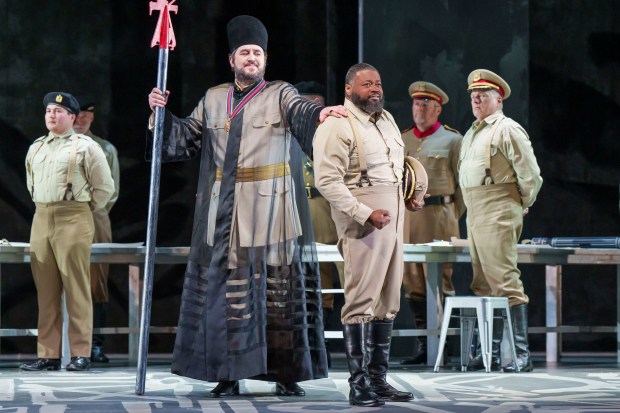[ad_1]
Reginald Smith Jr. is fresh off playing the (elderly) Emile in Terence Blanchard’s opera “Champion” Lyric Opera is having a great 2024 on stage. As King Amonasro of Ethiopia, the imposing baritone with a cane serves as the moral conscience in director Francesca Zambello’s staging of Giuseppe Verdi’s “Aida,” the first in more than a decade at the Lyric. This is a solid new approach that emphasizes the internal strife and geopolitical consequences of love affairs with enemies rather than the personal tragedy of the love triangle between Radamès (Russell Thomas), Amneris (Jamie Barton), and Aida (Michelle Bradley).
The most powerful moment comes not when the walls close in on the two doomed lovers, but when Smith’s Amonasro admonishes Bradley’s Aida to “think of our suffering people.” You’re their only hope.” This isn’t really something a fighter, let alone a lover, wants to hear, and you never feel like Aida is making an effective comeback in this production. Radamès’ sensual charm is deliberately reflected here only by how strong Thomas is in the role. It goes as far as it seems.
Originally conceived in 1871 as an opera about the war between Egypt and Ethiopia, and always a spectacular spectacle to the extent that Verdi had any knowledge of the land, this much-loved opera now presents some tricky elements in representation. Perhaps as a result, Zambello created his own geographical landscape for this new staging in Chicago, visually dominated by a kind of pseudo-hieroglyphic language, designed on the West Side by Los Angeles-based artist RETNA and then rendered into the landscape. elements by set designer Michael Yeargan. Essentially, you have a contemporary staging that deliberately departs from a specific geographic identity or even time, freeing up casting possibilities. But there are also enough keys that those who prefer more familiar ideas will feel that the original Verdi context has been honored. To some extent.
This is a masterful compromise between traditionalism and experimentalism; the “you should try to offer both” principle that has been a hallmark of retiring general manager Anthony Freud’s post-pandemic programming at the Lyric. Freud looked at seasonal programming this way; I noticed that Zambello applies this concept on a more detailed level here. The production features traditional ballet music and dance for an epic experience, but Jessica Lang’s choreography also uses its own language; sometimes very effective, sometimes quite far from an aesthetic core, not always easy to understand, but clearly dealing with themes of inequality and internal political crisis.
Of course, when you have a design concept revolving around hieroglyphic text, those visuals need to be viewed vertically to be appreciated, and that means Yeargan’s design works without much in the way of platforms or risers; Considering all the demands of the show, it’s unusual to see an “Aida” without constant changes in visual height.
However, you won’t feel the absence of visual delight: Costume designer Anita Yavich uses gorgeous fabrics that shimmer in the light even as she plays with contrasting topics like wealth and power. You’ll see things transition from masculine military displays to feminine territory filled with children. And certainly the irony of the staging lies in the ability of all these male leaders to claim that all choices are made by the gods; This is an excuse for centuries of oppression.
Bradley and Thomas are often remarkably gentle and sweet when they sing, especially when together; conductor music director Enrique Mazzola finds sharp musical contrasts to support what we are watching. There’s a kind of fatality to Bradley’s “Celeste Aida” that serves as a counterpoint to the libretto, and Thomas also vocally focuses on his character’s painful plight rather than the optimistic prospect of love. Add in the fact that Barton voice-overs the tense, troubled, conniving Amneris, always able to foresee the end of this story, and you have not so much a struggle for a man as a broader abdication of responsibility. This moral, social force, most powerfully expressed by the stirring Lyrical Opera Chorus, is at the mercy of three would-be lovers who always put themselves first.
Chris Jones is a Tribune critic.
cjones5@chicagotribune.com
Review: “Aida” (3.5 stars)
When: Until April 7
Where: Lyric Opera, 20 N. Wacker Drive
Working time: 3 hours 5 minutes
Tickets: $49-$339 and by calling 312-332-2244. www.lyricopera.org
 Best American Comics News bestamericancomics.com started its broadcasting life on December 21, 2022 and aims to offer original content to users. Aiming to share information in technology, science, education and other fields, bestamericancomics.com aims to provide its readers with the most up-to-date and comprehensive. Since the content of the site is created by expert writers, readers are reliable and accurate referrers.
Best American Comics News bestamericancomics.com started its broadcasting life on December 21, 2022 and aims to offer original content to users. Aiming to share information in technology, science, education and other fields, bestamericancomics.com aims to provide its readers with the most up-to-date and comprehensive. Since the content of the site is created by expert writers, readers are reliable and accurate referrers.






